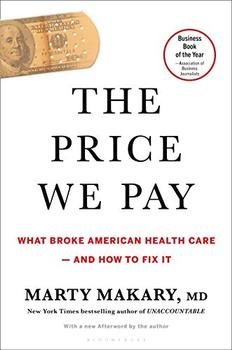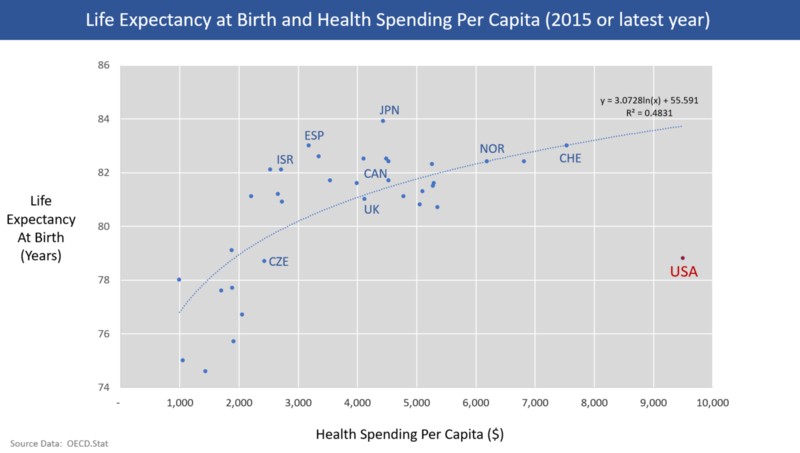Summary | Excerpt | Reviews | Beyond the Book | Read-Alikes | Genres & Themes | Author Bio

Critics' Opinion:
Readers' Opinion:
First Published:
Sep 2019, 288 pages
Paperback:
Jun 2021, 288 pages
 Book Reviewed by:
Book Reviewed by:
Tara Mcnabb
Buy This Book
This article relates to The Price We Pay
As discussed in Marty Makary's The Price We Pay, the United States is one of the wealthiest countries in the world, and it spends more money per person on healthcare than any other developed country in the world. Recent data from the Organisation for Economic Co-operation and Development (OECD) shows that America spent $10,209 per capita on total healthcare costs in 2017, more than any other of the 36 nations in the OECD. However, this higher spending does not lead to more effective services, and the nation's healthcare system has become an object of shame and outrage among many of its citizens.

According to a July 2017 report from The Commonwealth Fund, the U.S. came in last among eleven developed countries when it came to health outcomes and quality of care. Other aspects of the report are just as bleak. Compared to European countries such as Sweden, the United Kingdom, and France, the U.S. has the highest rate of medical, medication, and lab errors; and 16% of patients in the U.S. visited the ER for a non-emergency issue in 2017, compared to only 5% in Germany and 9% in Switzerland.
What are the reasons for such differences? One of the most important is that all European countries offer universal healthcare coverage; these nations' governments guarantee every citizen access to medical services, and ensure that such services do not expose patients to financial suffering. This is in stark contrast to the U.S., where government programs such as Medicare provide health insurance only to certain sections of the public. In America, healthcare is mostly run as a for-profit private enterprise; as explained in The Price We Pay, large private insurance companies have converted medicine into a business in America over the past four decades. These companies seek to raise the prices of medical services to sky-high levels. In the absence of strong government regulation, healthcare providers today have the power to inflate prices five times above the average market price and garnish the wages of patients who cannot afford to pay their full bill. Such predatory practices contribute to a lack of transparency and honesty in the administration of U.S. healthcare.
The idea that medical care should be accessible for all citizens is common across much of the world, but countries differ in how they structure healthcare. For example, France guarantees universal healthcare insurance via a multi-payer healthcare system funded mainly by payroll taxes plus payments at time of service. Non-profit, independent hospitals provide the majority of services, alongside doctors who work in private practice but are paid mostly from public insurance funds. The government determines the price of all goods and services, and refunds 70% of most costs direct to the provider, rising to 100% in the case of costly or long-term treatments, or where the patient has financial need. Supplemental health insurance coverage can be bought, mostly from nonprofit, mutual insurers.
Other countries, such as Britain, Italy, Norway, and Sweden also cover healthcare costs mostly through payroll taxes but offer a single-payer healthcare system, controlling healthcare services and employing medical providers directly. This means that all healthcare needs can be met through a sole healthcare provider and almost all services are free at point of use.
For example, in England, the National Health Service does not charge for doctor visits, nursing services, ambulance services, surgical procedures or appliances, medical tests, mental health services, physiotherapy or diagnostic services; and its treatment plans are often at the cutting edge of new research, for example in the field of immunotherapy for cancer. There are small charges for some things - for example, prescription refills are free for children, the elderly, and those on low income; everyone else pays £9 (approx. US$12); and dental services are available for £20.60 for an examination, £56.30 for a filling etc. There are wait-lists for some elective surgeries, and there is a shortage of dentists willing to accept NHS patients, so some people do pay for private dental care, and about 11 percent choose to take out private medical insurance (often through their company) so as to get non-urgent treatment at a time convenient to them, but this private healthcare costs a fraction of what it would in the USA, because it is designed to only kick in in certain circumstances.
Many changes in healthcare will be needed if America is to solve its current crisis. Taxes in Europe for healthcare currently are higher than in the U.S., but even Americans fortunate to have health insurance have to contend with costly premiums, copays and deductibles that citizens of European countries do not. Worse yet, the American healthcare industry does not have robust government oversight, leading to a lack of accountability in medical billing and subpar care. This is illustrated in the chart that shows the U.S. with a very substantially higher per capita healthcare cost than any other country, and a life expectancy rate on a par with countries that spend one-fifth of what the U.S. spends on healthcare. As the U.S. seeks healthcare solutions, it wouldn't hurt to turn toward European countries' systems for pointers.
Chart of life expectancy at birth vs. expenditures on health spending per capita in OECD nations (OECD = Organisation for Economic Co-operation and Development).
Filed under Society and Politics
![]() This "beyond the book article" relates to The Price We Pay. It originally ran in November 2019 and has been updated for the
June 2021 paperback edition.
Go to magazine.
This "beyond the book article" relates to The Price We Pay. It originally ran in November 2019 and has been updated for the
June 2021 paperback edition.
Go to magazine.





The Funeral Cryer by Wenyan Lu
Debut novelist Wenyan Lu brings us this witty yet profound story about one woman's midlife reawakening in contemporary rural China.
Your guide toexceptional books
BookBrowse seeks out and recommends the best in contemporary fiction and nonfiction—books that not only engage and entertain but also deepen our understanding of ourselves and the world around us.